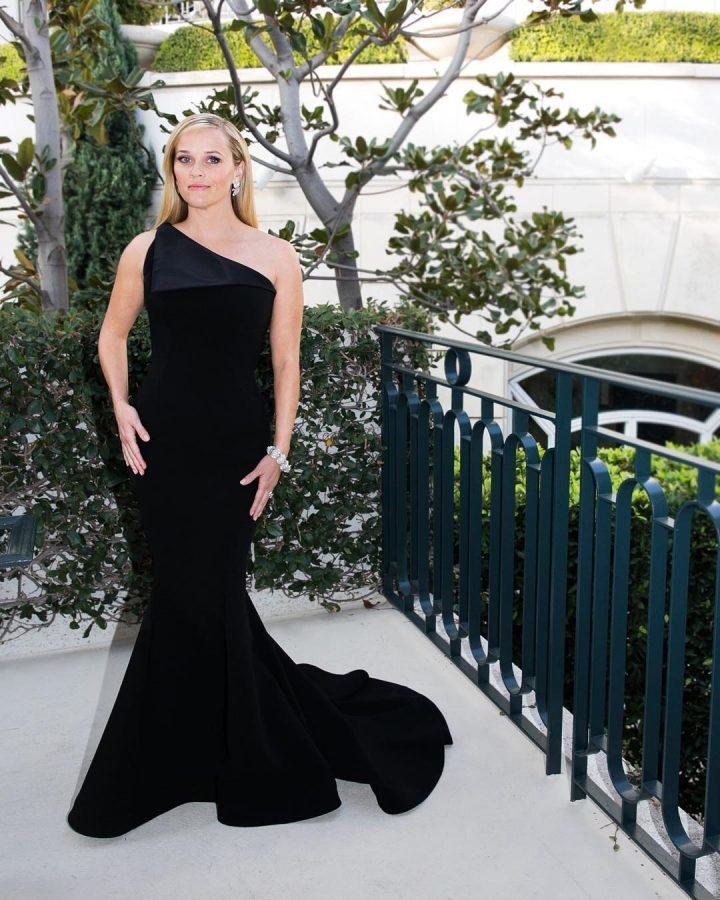#TimesUp and Gender Equality
Reese Witherspoon was among the many women and men who wore black to the Golden Globes in support of Time’s Up.
February 7, 2018
On Jan. 7 — the night of the Golden Globes — the women and men of Hollywood came together to confront sexual misconduct in the workplace. At this star-studded event, prominent figures in the film industry called “Time’s Up” on the resign of sexual harassment, especially in professional settings.
For some, the Golden Globes was a first exposure to the Time’s Up movement. Without context, it could be easily misconstrued as celebrities simply wearing black to an award show. However, there is a lot more to “Time’s Up” and the display of solidarity at the Golden Globes.
Sparked by an emotional letter from the Alianza Nacional de Campesinas and the #MeToo movement, which itself developed after allegations against Harvey Weinstein and other media moguls surfaced, “Time’s Up” aims to give a place for victims of sexual abuse in the workplace to develop a narrative that offers more nuance than the label of victim. The movement also places emphasis on taking the appropriate legal actions to ensure and secure some semblance of justice in sexual assault cases — even providing a $15 million legal fund and many other accessible resources to “enable more women and men to access our legal system to hold wrongdoers accountable.” These resources continue to grow as more and more men and women all over the world support the cause by donating to the fund, signing their name to the moving letter and extending their own skills and assistance to the movement.
Many would consider the rationale behind this movement and the impacts to be a good thing, however, support is not unanimous. It depends who you ask. At NYU there seems to be no common consensus. Some students, like CAS freshman Matthew Spaargaren, are in vehement support of the movement.
“Well, I am glad that there are such movements out there to hold really gross and vile people accountable for their actions and not let them get away with what they’ve done,” Spaargaren said.
While there is widespread support for the movement, some students like LS freshman Srishti Luthra believe that more needs to be done because of the complexity of the issue.
It was well-intentioned but a mere token gesture,” Luthra said.
Department of History, American Studies, Gender and Sexuality Studies Professor Linda Gordon said that the scale of the movement should not be written off completely, but must be built upon.
“It’s a small gesture, it’s very, very small though,” Gordon said.
She thinks that demonstrations like the “Time’s Up” movement are individualistic and aren’t efficient in making a sustained difference.
“I think what’s needed is collective action,” Gordon said. “Organized action that in fact has to concentrate more on the needs of women who are low income women because those are the women who have the fewest protections.”
Despite fervent support from everyday people and celebrities alike, there are still many people that are unenthusiastic. They feel disillusioned by the lack of consistent support at all major award shows, celebrities wearing a ‘Time’s Up’ pin only to be subsequently accused of sexual misconduct and the likes of Woody Allen continuing to make a profit despite being a confirmed sexual assaulter.
We were met with an underwhelming response at the Grammys as it seemed the celebrities of our generation were done with their social crusade. An attempt at consolidation was made by select artists like Miley Cyrus, Kelly Clarkson and Rita Ora who wore white roses to show their support for Time’s Up, but the stand was not nearly as widespread or powerful as the one taken at the Golden Globes. This begs the question of why this movement wasn’t extended to the music industry. It is not as though the music industry doesn’t need help in that department – we see this time and time again in cases like those of Kesha and Taylor Swift. In fact, the nominations of the 2018 Grammys itself, in which Lorde was the only woman nominated for Album of the Year yet the only nominee not performing, show us just how much further there is to go when it comes to gender inequality in this industry. Sure, progress is being made in some aspects and many black men were nominated for their musical achievements but much fewer black women were given the same recognition. Actually, there were only around three black women nominated in total.
NYU students and professors alike seem to agree that the “Time’s Up” movement’s next step should be to increase its focus and work on a more comprehensive definition.
“Sexual harassment is going to be hard to legislate against because of the problem of defining it,” Gordon said. “I’m not saying we shouldn’t try; we should try but we have to understand that it will be difficult.”
With the Oscars fast approaching, we’re all left wondering whether the “Time’s Up” movement will make another appearance, or if it’s another celebrity social fad that is destined to die out.
Email Ria Mittal at [email protected].















































































































































